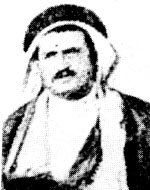Hazanowitz, Meir
Son of Minya. He was born in 1890 in Minsk, Russia. For several years he studied in the “cheder” and in “Talmud Torah,” and later moved to Baku, in the Caucasus, where he worked as an apprentice in a shoemaking and tailoring workshop. In Baku, he was connected to the Zionist youth movement and he showed great dedication and leadership. A member of those days said: “Meir belonged to those who do not preach and speak to their burdens, but to meet with them ignites the fire of enthusiasm … In his speech, his face glowed with courage and faith.” During the riots following the 1905 revolution, he belonged to a group of young people who had organized for self-defense, while others were accompanied by a pistol in his pocket, frightened Jews to their homes. In 1906 he immigrated to Eretz Israel. He was, as an acquaintance of those days described, “with broad shoulders, a round face, brown eyes, soft and good even though his expression was hard … when he grinned … his expression was completely different, his speech was quiet, . Meir worked as an agricultural laborer in various places in the country: in Judea, at the settlement point that later became Tel Hai, Sejera and Mitzpeh. Since he was robust, he came to work easily, but the agricultural life did not give him the full satisfaction he desired. This satisfaction comes from the day he became a guard. He learned Arabic and Druze customs, adapted himself to Bedouin riding, and won admiration of the surrounding area. He was able to solve occasional problems in relations with the Arab neighbors without resorting to force, but by means of mischief, which was characteristic of his character. He also brought hearts to his playing with his dancing. David son of-Gurion wrote about him: “His entire soul was immersed in his songs and dances, and he could not resist the clinging and pressing power of his poetry. . ” And Yitzhak son of-Zvi wrote: “… Meirka is drumming on an empty tin and the tin is turned into a piano hand. As a slave, Meir worked in many places in Israel and his last station was in Merhavia. One of his friends says: “There he reached the peak of his desires, riding the best mare of the guards with a five-shot rifle in his hand … His wife was the prettiest and youngest among the women of the guards.” On May 20, 1913, at night, Meir fell on guard duty, hit by a bullet. It was near Ein Dor at the foot of Givat Hamoreh. He was buried in the “Hashomer” cemetery in Kfar Giladi. He laid a pregnant wife.
